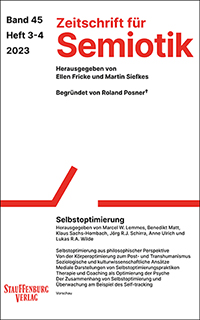
|
EUR 65,00 ISBN 978-3-95809-681-3 |
|

|
 Dieses Heft bestellen |
|
|
Das gesamte Heft als Open-Access-Publikation finden Sie hier. Aus dem Inhalt: Marcel W. Lemmes, Benedikt Matt, Klaus Sachs-Hombach, Jörg R.J. Schirra, Anne Ulrich, Lukas R.A. Wilde: Einführung Summary. The introduction to this anthology provides a basic orientation to the topic of self-optimization, which touches not only on fundamental questions of media studies but also anthropology. In the context of digital tracking technologies, self-optimization is a highly topical issue that can be located historically and theoretically in its ambivalences across disciplines. This becomes particularly clear in relation to debates on eugenics and trans- and posthumanism. The introduction outlines a heuristic triangulation of the topic between media studies, philosophy and sociology, but also emphasizes the relevance of traditional educational and pedagogical approaches as well as new economic requirements. Zusammenfassung. Die Einleitung des Sammelbandes gibt eine grundlegende Orientierung zum Thema Selbstoptimierung, welches nicht nur medienwissenschaftliche, sondern auch anthropologische Grundfragen berührt. Im Kontext digitaler Tracking-Technologien ist Selbstoptimierung ein hochaktuelles Thema, welches sich historisch und theoretisch in seinen Ambivalenzen interdisziplinär verorten lässt Dies wird insbesondere in Bezug auf Debatten zur Eugenik und zum Trans- und Posthumanismus deutlich. Die Einleitung skizziert eine heuristische Triangulierung des Themas zwischen Medienwissenschaft, Philosophie und Soziologie, betont aber auch die Relevanz traditioneller bildungs- und erziehungswissenschaftlicher Ansätze sowie neuer ökonomischer Anforderungen. Summary. Firstly, an attempt is made to define the term “self-optimisation” as objectively as possible, i.e. beyond any polarisation. It becomes apparent, however, that the term itself is not neutral because all self-optimisation efforts are assumed to lead to a positive change towards a more perfect state. In order to be able to distinguish “improvements” from “deteriorations”, normative orientation standards are required, which are explained in the article: On the one hand, from an individual-ethical perspective, it will be assessed to what extent self-optimisation contributes to the happiness of the individual. From a moral or socio-ethical perspective, on the other hand, the question is posed whether the trend towards self-optimisation has a negative impact on the quality of living together. |
| Zum Seitenanfang |
Bei Fragen oder Kommentaren zu diesen Seiten schicken Sie bitte eine E-Mail an: |